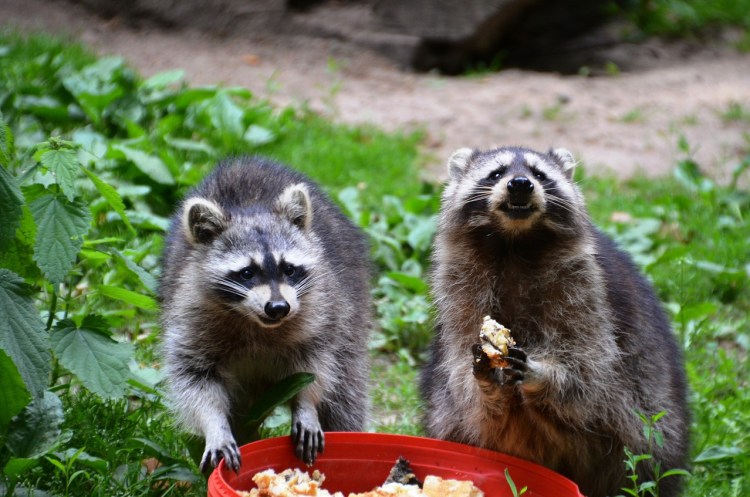
By: Jason Ruiter Orlando Sentinel
Elvin Rodriguez’s 9- and 10-year-old sons were playing basketball at dusk on the driveway at their Tavares home when a nocturnal creature slipped through the fence.
After the raccoon started chasing the boys, the family’s dog, a 6-year-old boxer named Macho, came to their defense.
“I think he [Macho] knew, I think he heard the kids yelling and carrying on and he just jumped right in,” Rodriguez, 34, a Lake County Jail correctional officer, said Wednesday. Macho fought with the raccoon before Rodriguez, who grabbed his personal handgun, was “able to call him off” from the battle that left the dog with scratches around his eyes and ears. “Then it stopped for a minute, and hissed, and I was able to shoot it.”
The raccoon tested positive for rabies after the March 13 encounter, marking the fourth time in seven months a rabid animal has threatened Lake County residents.
“It didn’t sink in until afterwards; I was just trying to make sure the kids were OK,” Rodriguez said. “It [rabies] can be very serious.”
WORRIED ABOUT RACCOONS?
1-866-263-WILD!
In September, a 74-year-old Clermont man was wearing flip-flops and shorts, picking up fallen branches outside his home near Lake Minneola, when a rabid fox lunged at him. He beat it off with his iPhone, dazing it, before fatally shooting it with a .22-caliber pellet rifle. And last month, another rabid raccoon was reported to be in Fruitland Park, according to the Florida Department of Health in Lake County.
“Rabies is a potentially fatal disease. It is important not to handle wild animals, to be aware of unusual acting animals and to keep pets vaccinated against rabies,” department administrator Aaron Kissler said.
Macho is now quarantined in the kennel on Rodriguez’s property until April 27.
For more information or a FREE estimate
call 1-866-263-WILD!
Or easily contact us by clicking here.
He has been given vaccine shots and antibiotics and Lake County deputy sheriffs will make weekly checks to see if he’s developed signs of rabies, such as aggressive behavior or extreme salivation. The disease infects the nervous system.
“The kids are worried about him [Macho],” Rodriguez said. “They ask every day if he’s going to be OK.”
The number of reported rabid animals declined in 2015 by 8.7 percent in the U.S. and Puerto Rico to 5,508, according to the American Veterinary Medical Association. Bats, raccoons and skunks accounted for 85 percent of those cases.
In Central Florida, there were eight cases of rabid animals in 2017, according to the health department.
Rodriguez said Macho is “probably confused” about why he’s stuck in the dog house 24-7, but hasn’t showed any weird behavior since the incident.
“No signs,” he said. “So far.”
There are health risks that you should be aware of after any wild animal has been taken from your home.

The health risks of raccoons should never be underestimated. Raccoons create enormous damage and transmit infectious diseases to Parrish adults, children and pets. Contact a licensed and insured nuisance wildlife management company for expert raccoon removal, raccoon trapping and raccoon exclusion services.
The Health Risks of Raccoons
It’s important that you have that Parrish raccoon removed from your attic, crawl space, basement or other building location before things get out of hand. Raccoons contaminate building surfaces with urine and feces and chew up everything from electrical wires to support beams. If you hear noises in your attic, call a wildlife removal professional before a raccoon or some other wild animal causes significant damage or even a catastrophic fire.Wild animal droppings harbor dangerous parasites and foster the growth of mold and microbes. Raccoons are known carriers of infectious diseases that can be contracted by humans and pets.
• Raccoon Roundworm, or Baylisascaris, is a dangerous species of roundworm carried by raccoons. Millions of roundworm eggs are deposited into the environment through raccoon feces. Children and pets can easily ingest fertile eggs by coming into contact with infected soil, tree stumps and other seemingly safe locations. Once inside the body of an animal or human, the larvae migrate throughout the body and infect the brain, eyes, spinal cord and other organs.
• Rabies is a health risk commonly associated with wild animals. Rabies, which attacks the central nervous system, can be fatal if left untreated.
• Leptospirosis is a bacterial infection spread to humans through raccoon feces and urine. Common symptoms include nausea, vomiting, diarrhea, severe headaches, high fever, anemia, meningitis and organ failure.
• Salmonella is also spread through raccoon feces. Humans and pets can ingest the bacteria through incidental contact with infected areas. The symptoms of Salmonella poisoning include high fever, severe diarrhea and abdominal pain.
Raccoon Trapping and Exclusion
A wildlife management expert can humanely remove and relocate raccoons and other nuisance wild animals. Professionally trained wildlife removal specialists can also decontaminate building materials, repair all damage and permanently seal your home or business to ensure that the problem doesn’t reoccur. Local wildlife management companies provide expert raccoon trapping, raccoon removal and raccoon exclusion services in the greater Parrish area.
WORRIED ABOUT RACCONS?
Call 1-866-263 WILD!
Need a raccoon trapper in Lakewood Ranch, FL or elsewhere in Manatee/Sarasota County?
Raccoons can gain entry to homes and businesses by squeezing through hard to detect gaps and holes in rooflines, HVAC systems and foundations. Rats, mice and squirrels breed and contaminate food and building surfaces quickly.
For more information or a FREE estimate
call 1-866-263-WILD!
Or easily contact us by clicking here.
Check out our Animal FAQs from our customers!











